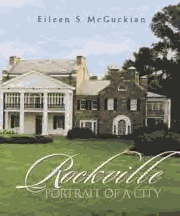
Rockville, Portrait of a City.
Hillsboro Press, Franklin, Tennessee, 2001.
Chapter 4, pp. 50-51.
© City of Rockville
Local Historian
Account
An account by local historian, Eileen McGuckian.
 |
McGuckian, Eileen S. Rockville, Portrait of a City. Hillsboro Press, Franklin, Tennessee, 2001. Chapter 4, pp. 50-51. © City of Rockville |
The Reality of War
....
General George McClellan's army of the Potomac headquartered in Rockville in the month before the Battle of Antietam. McClellan stayed the night of September 7, 1862 at the house of the pro-Union Beall sisters in Rockville, then spent several days encamped near the intersection of Great Falls and Seven Locks Roads. Thousands of Federal troops sprawled on the Carter farm west of Rockville and pitched tents at Glenview on the Baltimore Road.
Before McClellan moved west toward Antietam, the courthouse in Rockville became a Union hospital holding about 325 patients. A Union army surgeon had previously assessed Rockville's position: "The houses are few and of poor quality, affording limited accommodations for the sick and wounded .... and as the roads are now nearly impassable from the deep mud, it will be impracticable to transport the sick either to Frederick or to Washington without much suffering." Nevertheless during the 1862 Maryland campaign, Federal forces assigned a surgeon and a burse to supervise the field hospital and to obtain from local families items the army could not provide.
After the bloody battle at Antietam Creek on September 17, 1862, which killed 4,000 Americans and injured 18,000 more, the entire countryside was called upon to assist wounded from both armies. Horse-drawn ambulances delivered casualties to Rockville. One observer wrote that "the extensive grounds of the court house were soon occupied by the soldiers who had fallen out from the commands and many sick soldiers were already in the rooms of the court house lying upon the bare floor.... I was dispatched with the army wagon to the farm houses to get a load of straw and later for a couple sheep to be slaughtered for soup...." This member of the U.S. Christian Commission (which cared for the spiritual needs of Union soldiers) also held an impromptu religious meeting under the trees in front of the courthouse.
The presence of so many soldiers created problems in Rockville. Union troops frequently plundered nearby farms for fresh eggs, chickens, pigs, and milk. In September 1862, Unionists Judge Bowie, James Henning, and John England asked Gen. Nathaniel Banks to protect Rockville and its vicinity from further annoyance and loss. Banks replied that although it was not practicable to station a provost guard permanently at Rockville, cavalry would be sent out to pick up military stragglers on Rockville roads and farms.